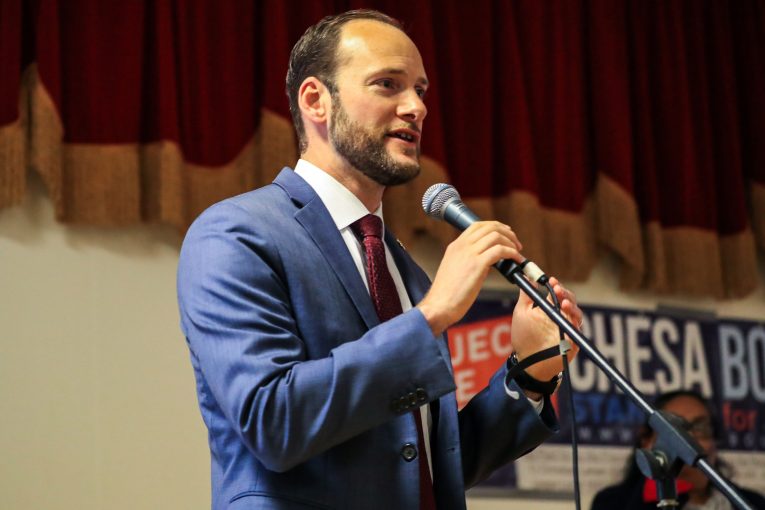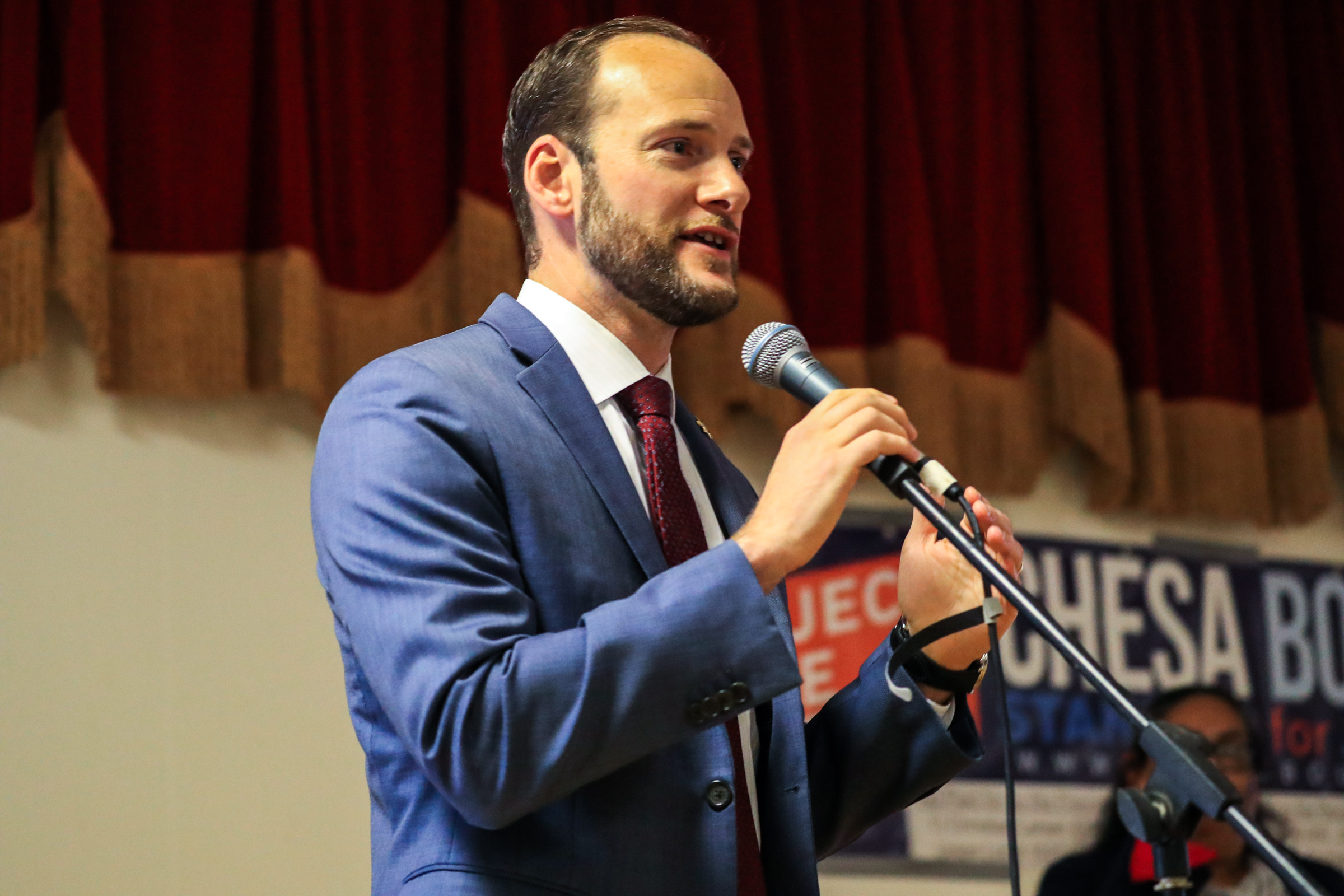

By David M. Greenwald
Executive Editor
San Francisco, CA – It wasn’t the 20-point blow out it looked like when the votes were initially counted on Election Day, but the voters of San Francisco have turned out DA Chesa Boudin after just two and a half years. His term ends on July 8—Mayor London Breed has yet to announce whom she is appointing to replace him.
Boudin told the Vanguard on Tuesday in a phone interview that he has a number of options but has yet to decide, and he again left open the possibility that he will run for DA again.
One of the triggering events to the recall was Troy McAllister on New Year’s 2021 and his killing of two pedestrians—McAllister had been released from custody and many questioned whether he should have been.
Boudin in an early conversation with the Vanguard in 2019 was concerned that, at some point, someone released from prison or jail might commit a serious crime and there could be a backlash. As it turns out, he was right.
“I knew it was something we had to be worried about for a couple reasons,” Boudin  explained. “One is it’s a classic conservative police union playbook, you know, it’s, it’s not new, it’s not creative, it’s not original, but it has been used for decades and it has worked.”
explained. “One is it’s a classic conservative police union playbook, you know, it’s, it’s not new, it’s not creative, it’s not original, but it has been used for decades and it has worked.”
He noted that this has worked even at the presidential level, with Willie Horton.
Boudin added, “The criminal justice system, no matter who is the DA, is managing tremendous amounts of risk every day, with really, really imperfect tools and resources.”
He noted, in this case, “the police don’t bring us enough evidence to file charges. Or in other instances, a judge refuses to detain somebody that we think should be held in, or because in other cases, the constitution or presumption of innocence, due process requires certain kinds of procedural limits on the ability to preemptively detain someone who may pose risks.”
In addition, even when they do get a conviction, “so many of the problems that led people to get arrested in the first place were still there waiting for them when they get out—addiction, homelessness, lack of access to healthcare, untreated trauma, easy access to guns, you name it.”
So, he said, “in a world where those things are defining features of the criminal legal landscape, and where they are frequently and successfully weaponized by conservatives against anyone who so much whispers the word reform…”
“I’ve learned a tremendous amount. It’s been a very steep learning curve. about some of the real quagmires of local government,” Boudin said. “I’ve learned about the real resistance of established bureaucracies to any kind of change. I’ve learned about the resilience and the hard work and the creativity of so many of my staff.”
He noted that the opposition attacked him and his office, using $7 million for the campaign and they had to continue to operate and attempt to reform the system.
Part of the problem was the media, which he sees as a fourth branch of government.
“For democracy to function, we need a vibrant, free, fair and independent press,” he said. “I think in many ways, changes in the last couple years, the pandemic ,social media, the Trump administration and other changes have really put a lot of that to a test, and there’s no question that the nature of media coverage of me and my (record) was totally out sync with the facts in many cases, and also with the way that these issues are covered in other jurisdictions, by the same reporters and the same outlets.”
He cited frustration at times to see some publications with “public outright lies” and then “take those lies to victims and try to inflame them.”
He noted times when they said they dismissed cases, that they hadn’t dismissed.
Other times, they “really set expectations in ways that are totally disconnected from what we actually do.
“I was blamed for murders that occurred in other jurisdictions. I was blamed for businesses closing that closed before I was even in office and for problems that have been decades long problems in San Francisco,” he added.
Chesa Boudin acknowledges that there were things that he could have done better.
“We made mistakes every day,” he said. “That’s the nature of being a big office.”
Boudin said that “the biggest thing is that at the outside of the pandemic, we didn’t do an effective enough job of preparing the public for what the work shutdown would mean for our office. And for individual cases trying do justice and provide victims with closure.”
Operating under the limitations of COVID and going from 300 jury trials a year to 30, forced them “to make difficult decisions about what cases we have the bandwidth to actually charge.”
As he has said elsewhere, Chesa Boudin told the Vanguard that he is definitely considering running again.
He noted that this is a huge family decision, “I need to really have the space and time to talk through with my wife and my family.”
A lot has happened since 2019, and last September he became a father, “We have a young son whom I haven’t gotten enough time with.”
Early this year, his mother passed away.
“I haven’t been out to help pack her things or plan her memorial service,” he said. Moreover, his father was released from prison after decades, and “he needs support. Those are all major life developments that happened just in the last 10 months.”
The more immediate question is what he would do next. He has a lot of offers from academia to writing to media related stuff and criminal defense.
“I love litigating and there’s lots of ways that I might continue to litigate, but I haven’t made any decisions about what my next step will be,” he said.
Overall, he believes “the criminal justice reform movement is strong. It’s really as strong as it’s pretty well been.”
He noted that there were a lot of early takes on the outcome of his recall for the progressive prosecutor movement, “but those were based on election night only results. Obviously the numbers were very different at the end of the vote count.”
He said that “one of the things that’s really important to remember is that despite the recall campaign spending the unprecedented amount of 7 million to spread lies and fear, and to attack me and my policies, they also spread the lie that they believed in criminal justice reform.”
Unlike people like Krasner, he said, this wasn’t a case where he was “running for reelection against a traditional tough on crime, police union backed candidate.”
He said, “This was a race where voters were being told that either way they voted on the recall was a vote for criminal justice reform and voters in San Francisco overwhelmingly support criminal justice reform.”
Boudin noted that he earned more votes in 2020 than he did in 2019 when he was elected.
Moreover, he noted that Anne Marie Schubert, who ran against Attorney General Rob Bonta, a reformer—“she got something like 10 percent of the vote in San Francisco.”
In addition, “There was a candidate who ran for governor attacking me and attacking Governor Newsom and framing himself as anti-homelessness, pro war on drugs, tough on crime, governor candidate, Michael Shellenberger. He got less than 10% of the vote, a lot less.”
He said that “the reality is in San Francisco, criminal justice reform is popular. It’s alive and well, and that’s true across the country because criminal justice reform is necessary to implement policies that make our communities safer.”


Let’s hope he does find a way to run again for D.A. in San Francisco or for some other office. He has the courage to make positive change and that is a more daunting challenge than ever these days. We need more people like him in public office at all levels everywhere.